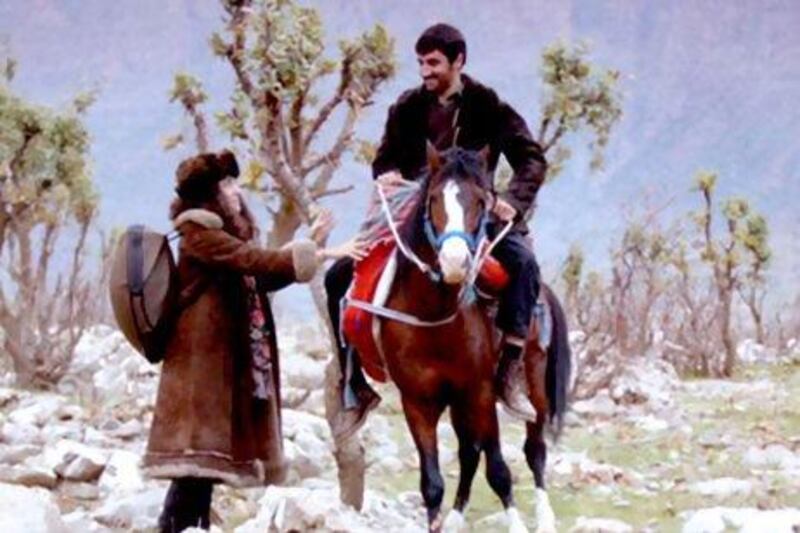One of the more intriguing and exotic entries in this year’s Cannes Film Festival, which has just ended, was My Sweet Pepper Land by the Iraqi-Kurdish director Hiner Saleem. Starring Korkmaz Arslan as a former freedom fighter turned small-town sheriff, and the Iranian actress Golshifteh Farahani as a schoolteacher who defies social conventions to live an independent life, this unorthodox romantic thriller was partly financed by grants from the Abu Dhabi Film Festival’s Sanad fund for Arab cinema.
Set in a lawless mountain region of Kurdish Iraq, close to the Turkish border, My Sweet Pepper Land blends savage frontier justice with dark comedy and topical social commentary in a timeless, almost mythical setting. With its rugged backdrop, lone lawman hero and outlaws on horseback, the film feels like a classic Western transplanted to the Wild East. It could easily be retitled Once Upon a Time in Kurdistan. This was no accident, Saleem admits.
My original idea was to have a cowboy going around the mountains of Kurdistan, explains the 49-year-old director. Just one character, wandering around the mountains. Then, little by little, the love story was added, and other stories as well. It became heavy and thick but the original idea – that of a Western – remained. Also, I think Iraqi Kurdistan today looks very much like the United States did after the War of Independence. Everything has to be built – roads, buildings – and there is oil in Kurdistan now, so we have to enforce law.
Born and raised in Iraqi Kurdistan, Saleem grew up under Saddam Hussein’s oppressive regime, fleeing his strife-torn country at the age of 17. Now based in Paris, he has lived in exile for more than 30 years, but his films still deal with Kurdish themes and characters. Since Saddam’s fall in 2003, Saleem has been able to revisit his homeland and shoot there.
When I was 16 and facing an inward struggle, I went to the mountains, he recalls. After that, I decided that maybe I could do something better – anyone can use a Kalashnikov but a camera is different. A camera is stronger, and it makes people more scared. So I left Iraqi Kurdistan but after 2003 Iraq became a federal country.
In this part of Kurdistan, there is no censorship, there are no political prisoners. The biggest problem in Kurdistan today is corruption. I may have many criticisms to make of Kurdistan but I am proud of a lot of things, too, in the context of the Middle East.
Saleem’s film benefited from two Sanad fund grants – one for development last year, and another for post-production this year. Intishal Al-Tamimi from the ADFF, from the beginning he tried to push the movie, to help bring it into the light, says Saleem. I appreciate this a lot. It was very important. I hope we can make more things together with SANAD and the Abu Dhabi Film Festival. I will be in Abu Dhabi with the movie in October.
Saleem’s sales agents signed several distribution deals for My Sweet Pepper Land in Cannes last week. But the director remains uncertain whether his film will play widely across the Middle East.
I would be very happy if Arab countries, especially in the Gulf, wanted to show my movie, he says. But, for me, Sanad’s participation is more important culturally and politically than financially.
It shows that this country is becoming more open to other cultures in the Middle East and other places. This gives hope for future relations between different countries. We have to get to know each other and discuss things. I am all for dialogue. When two people can speak together, we do not need the army.
SANAD FILMS
Launched in 2010, ADFF’s SANAD fund aims to promote and support Arab cinema by awarding financial support to specific film projects, with development grants of up to US$20,000 (Dh73,500) and post-production grants of up to $60,000. Here are a few notable beneficiaries:
On the Edge (Morocco, France, UAE) The director Leila Kilani’s debut feature is a snapshot of rebellious young women in contemporary Casablanca. The film premiered in Cannes in 2011 and picked up awards in Thessaloniki and London.
When I Saw You (Palestine, Jordan, UAE) Annemarie Jacir’s heartwarming drama about Palestinian refugees in 1960s Jordan features a terrific lead performance by the 13-year-old Mahmoud Asfa. The film was later chosen as the official Academy Awards contender from the Palestinian Territories.
Lebanese Rocket Society (Lebanon, France) A fascinating historical documentary about Lebanon’s long-forgotten rocket programme in the early 1960s, it was co-directed by Joana Hadjithomas and Khalil Joreige. It screened at the Toronto and Doha Tribeca festivals last year.
El Gusto (Algeria, Ireland, France, UAE) There are echoes of Buena Vista Social Club in Safinez Bousbia’s uplifting, beautifully shot portrait of a multicultural Algerian orchestra reunited after decades. Won the ADFF’s inaugural FIPRESCI prize, and the Best Director from the Arab World award for Bousbia.
* Stephen Dalton
Follow us
[ @LifeNationalUAE ]
Follow us on Facebook for discussions, entertainment, reviews, wellness and news.





